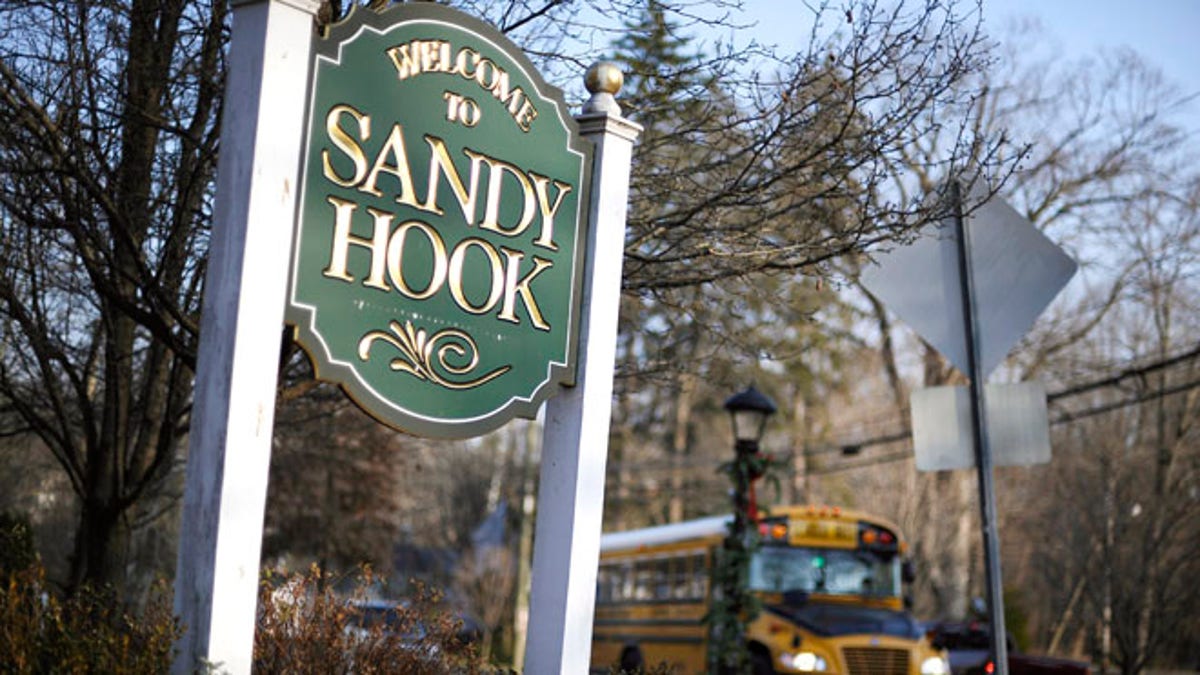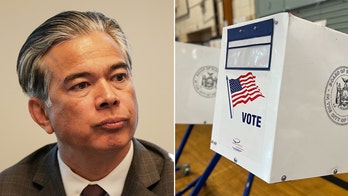
A school bus drives past a lamppost decorated for the holidays, and a sign reading Welcome to Sandy Hook, in Newtown, Conn. (AP)
A year after President Obama pledged "meaningful action" to address gun violence in the wake of the Sandy Hook school shooting, the White House has little to show for its aggressive campaign to pass new gun control legislation.
Instead, as the one-year anniversary of the massacre approaches, the Obama administration is shifting its focus to mental health as a way to prevent future shooting sprees.
"The fact that less than half of children and adults with diagnosable mental health problems receive the treatment they need is unacceptable," Vice President Biden said Tuesday, in a statement announcing new mental health spending -- as he met Tuesday with parents of Sandy Hook victims.
The statement, though, made no mention of assault weapons or gun background checks or other measures which, in early 2013, were the domestic priority of the Obama administration. Biden was tapped to lead the effort and, even after Congress rejected a gun control package, said the White House had not "given up." The vice president warned that those who don't get on board would pay a "political price."
It's unclear whether the administration will launch a second push for gun legislation. But with his political capital sapped amid the rocky ObamaCare rollout and one legislative defeat behind him on the firearms front, the president would no doubt be on weaker footing the next time.
The National Rifle Association and other gun-rights groups organized swiftly against the administration's post-Newtown effort to pass gun legislation. The most resounding rebuke came in April, when a law that would expand background checks on would-be gun owners failed in a 54-26 vote -- six votes shy of the 60 needed for the measure to advance.
The Senate also blocked a proposal that would ban the manufacture and sale of assault weapons and high-capacity ammunition magazines.
Following the vote, Obama blamed party politics in the Senate and called it a “shameful day for Washington.”
Lawmakers who voted against tougher gun measures argued that tightening laws unfairly punished their law-abiding gun-owning constituents.
The National Rifle Association argued that attacks like that at Newtown are representative of a weak mental health system, and says a fix lies in repairing that system, not in stronger gun controls.
A week after the Sandy Hook attack, NRA chief Wayne LaPierre called for armed guards in every school in the country.
Obama set about, though, to pursuing more modest changes, unilaterally.
Between the December shooting in Sandy Hook and the Washington Navy Yard shooting in September which left 12 people dead, Obama has taken 23 executive actions on gun violence, most of which were firearms-related. The actions did not require congressional approval.
Not all of the president’s initiatives were highly publicized. Initiatives ranged from local law enforcement officials and schools receiving additional training on how to handle an emergency situation similar to Sandy Hook, to moving to give law enforcement the ability to run full background checks before returning a seized gun.
The administration on Tuesday made a new push on the mental health front. Biden announced that the administration is pledging $100 million to improve mental health services as part of its response to the Connecticut shooting last year which ended with the deaths of 26 people, including 20 children, at Sandy Hook Elementary.
Some of the parents of the victims of Sandy Hook were in attendance. Fifty million dollars will go to the Department of Health and Human Services to expand behavioral health services for people with addiction problems. The rest will go to the Department of Agriculture to expand mental health services in rural areas.
Leading up to Tuesday’s announcement, there hadn’t been much progress on mental illness initiatives on a national level. Thirty-seven states, according to one study, took matters into their own hands by restoring or increasing funding from programs that had been cut. In all, more than $4 billion had been shaved off state mental illness budgets between 2009 and 2012.
Most notable was Texas. Lawmakers there gave their state the biggest funding boost in state history – green-lighting $259 million more for mental illness programs, according to the National Alliance on Mental Illness.




